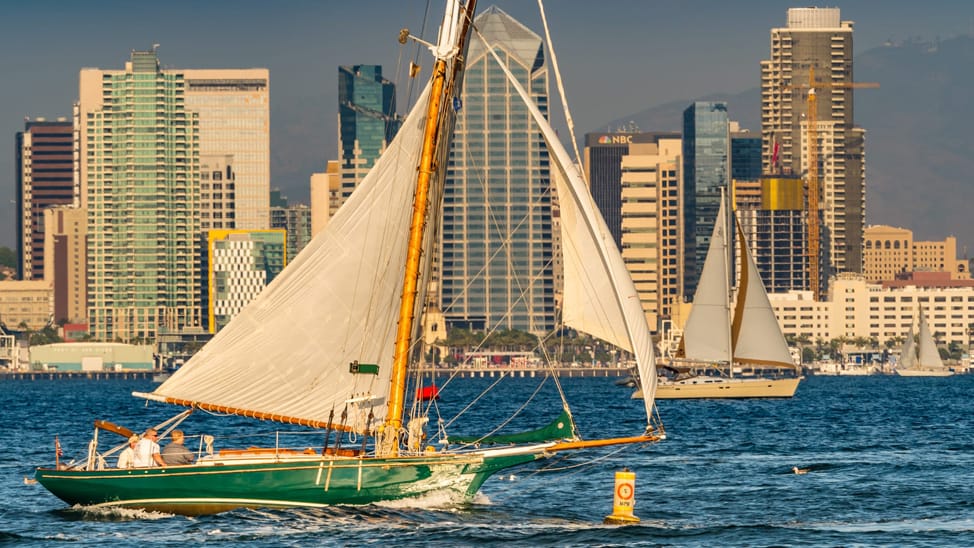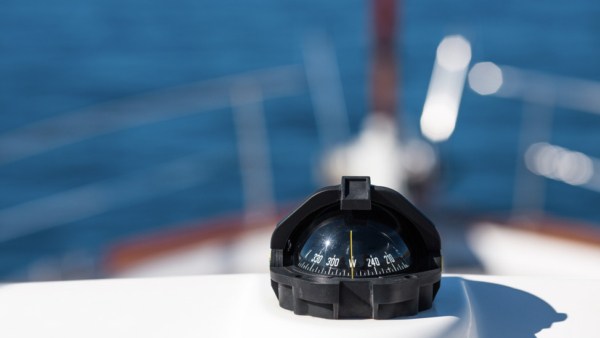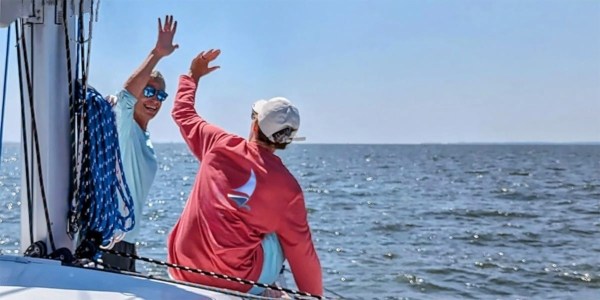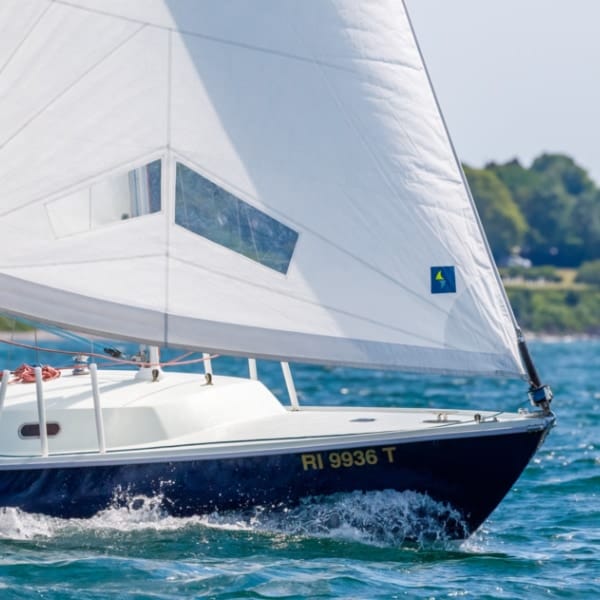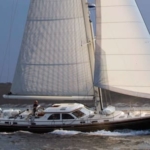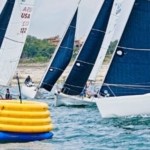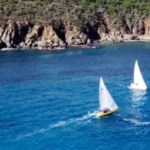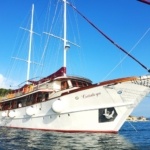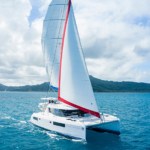In 1983, the American Sailing Association was founded by Lenny Shabes. Over the years, hundreds of thousands of sailors have become certified sailors with the ASA sailing curriculum. This year, we celebrate 40 years as the leading sailing education entity in the United States. So when you get out on the water, you can be sure that ASA-certified sailors are sailing safely and confidently.
Sailors have a way of speaking, and the sport has its own language. Some sailing phrases are common in everyday language, while others are only really used on a sailboat. The ones common in our everyday language have a nautical origin that will make you a more enlightened sailor, as well. The ones used only on a sailboat? Well, the sailing lifestyle lends itself to a specific language to describe situations and offer comedic relief when we are at the mercy of the conditions, and those will make you smarter and more adaptable in real life as well.
With that, we want to offer 40 sailing phrases you should know, some of which you may already be acquainted with.
Enjoy these sailing phrases, and may the best sailor win at nautical trivia night!
- Batten Down the Hatches – a phrase used to prepare for a storm, or in everyday language, prepare for a difficult upcoming situation.
- Aye Aye, Captain – a form of ”aye aye, sir”. It literally means “yes, yes” and is used in the military to show that the person who says it will follow an order that has been given and will follow it before doing anything else. It also shows the person knows the order and what it is requiring him or her to do.
- Fair Winds and Following Seas – a phrase derived from two original sources that has become a nautical blessing used to wish someone good luck on their journey. Fair winds speak to favorable winds that will carry you home, and following seas speak to the direction of the waves generally pushing you in the direction of your heading.
- Sheet Happens – a humorous phrase used when something goes wrong on a sailing trip. Sheets are the lines that trim sails.
- Ship-shape and Bristol Fashion – a term used to describe something that is in good order or condition. The word is of nautical origin, based on the obligation of a sailor to keep his or her quarters arranged neatly and securely due to the limited space typically allotted to service members aboard ship, and against turbulence at sea. Bristol fashion refers to the port’s days as a bustling port of trade.
- All Hands on Deck – During a storm or other crises, the boatswain’s cry of “all hands on deck” signaled the entire crew to handle the sail. These days it is an entreaty or order for everyone to pitch in and help with a problem or reach a goal.
- Shiver Me Timbers – in everyday language, an exclamation of surprise or excitement. In nautical terms, a reference to the timbers, which are the wooden support frames of a sailing ship. In heavy seas, ships would be lifted up and pounded down so hard as to “shiver” the timbers, startling the sailors.
- Walk the Plank – Sailors, usually pirates, set a plank that would hang off the ship’s side and made the punished sailors walk to the end and meet their death in the ocean. Today it’s a metaphor for receiving a punishment or facing a situation beyond one’s control.
- Keel Over – a term used to describe a boat tipping over on its side so far that it capsizes or turns turtle. In every day language, it refers to someone tumbling or falling over.
- Even Keel – The phrase even keel describes a ship that is level and balanced with its keel perpendicular to the surface of the water. Figuratively it has come to mean a calm, stable state of mind. The opposite is to keel over meaning to capsize.
- Taken Aback – A ship is pushed backward when violent winds or a careless helmsman cause the sails to blow rearward against the mast. This sudden predicament could snap the mast or severely damage the rigging. As a figure of speech, taken aback means to be astonished by some unwelcome occurrence.
- Three Sheets to the Wind – a term used to describe someone who is drunk. The sheets are the lines that control the sails on a sailboat. If the lines are not secured — particularly the three which are the two jib sheets and the mainsheet — the sails flop in the wind, and the ship loses headway and control, like a drunk person.
- Between the Devil and the Deep Blue Sea – The “devil” was the topmost plank of the ship’s side closest to the deck. Caulking this long seam in the tight space was a grueling task. One false move and a sailor could find himself plunging into the water. Today someone between the devil and the deep blue sea is in a lousy situation with no good options.
- Let the Cat Out of the Bag – A whip composed of nine pieces of cord with three knots at the striking end, the cat-o’-nine-tails was one of the authorized instruments of punishment in the British Navy until 1881. It was kept in a cloth bag. A sailor who reported the misdeeds of another let the cat out of the bag.
- Scuttlebutt – a nautical term for a water dispenser, but also a term used for gossip or rumors on board a ship. A “butt” was a large wooden drinking water cask where sailors gathered around and swapped rumors and stories. On long voyages, water was rationed by carving a hole in the cask’s side so that it could only be half filled. A cask with a hole was “scuttled.” Not much has changed except we now gossip around a water cooler.
- Anchors Aweigh – a phrase used to describe the moment when an anchor is lifted from the seabed; colloquially it also has come to mean the beginning of a journey.
- A Bone in Her Teeth – a term used to describe a boat that is moving fast through the water creating a prominent bow wave that looks similar to a dog with a bone in its mouth. Has also come to mean someone who is in a hurry.
- Tide Over – To tide over was the technique of alternating between sailing and anchoring when battling headwinds and unfavorable tides. This allowed a boat to hold its position until conditions improved. The term now describes enabling someone to get through a difficult period, most commonly by lending money, or with a child, to give a snack to tide them over until dinner.
- Sailing Close to the Wind – a term used to describe sailing as close to the direction of the wind as possible (any further and you would be in irons and unable to progress). Figuratively, this phrase means to be on the verge of doing something illegal or improper.
- Cast Off – a term used to describe releasing a mooring line or anchor so a vessel can set sail; in everyday language means to “set free”, for obvious reasons!
- Dead Reckoning – used in a navigation sense primarily; a method of navigation based on estimating a ship’s position using previous positions and estimated speed and direction of travel
- Helm’s Alee – a command used to turn the boat away from the wind, or tack. Primarily used on a sailboat, but also an American rock band that started in the early 2000’s in Seattle.
- Square-rigged, and Squared Away – a term used to describe a ship with square sails. To be squared away, a square-rigged ship had its yards (horizontal bars that held up the sail) positioned at right angles to the deck to best catch the wind. Squared away now means to put things in order or a state of readiness.
- A Shot Across the Bow – in everyday language, a warning or threat issued to someone. In the 18th century, navies forced oncoming ships to identify themselves by firing a cannon shot over their bow. If the approaching ship hoisted enemy colors an attack might ensue. Traditionally warships had the right to disguise themselves by sailing under neutral or false flags, but once they went into battle they were required to fly their country’s true colors.
- Crow’s Nest – a platform located high on a mast used as a lookout point. The term is sometimes used metaphorically for the topmost structures in buildings, towers, etc.
- Jibe Ho – a command spoken when jibing, and the sailboat is heading downwind and across the wind. It is a warning to sit down or be clear of the boom before it swings!
- Lower the Boom – The boom is the long horizontal pole that controls the movement of the mainsail. It can deliver sailors a knockout blow if it swings wildly or collapses in heavy weather. These days the phrase means to put a stop to, chastise, or rebuke.
- Headwinds – winds blowing in the opposite direction of the ship’s movement; has also come to mean resistance or opposition to a plan, often referred to as “economic headwinds” in business.
- Sea Legs – the ability to adjust to the motion of a ship and maintain balance; To “have one’s sea legs” is to be able to walk calmly and steadily on a tossing ship, or to become accustomed to a new or strange situation
- Run Aground; or High and Dry – to be run aground is when the bottom of the boat hits the sea floor and stops the boat. For a ship to run aground in a receding tide is to be left high and dry. Getting stuck with the check when everyone else has taken off is also to be left high and dry.
- Dead in the Water – when there is no wind and the water is completely still, giving no chance of any sailing. The phrase also means a proposal or plan with zero chance of success.
- Fathom – a unit of measurement for depth, equal to six feet. This nautical unit of measurement is based on the span of a man’s outstretched arms. The word comes from the Old English “faedem,” to embrace. Sailors measured ocean depths, anchor chains, ropes, and cables in fathoms. Although marines eventually abandoned fathoms for meters, we onshore still reach for the word fathom to express our ability to comprehend, grasp, or get to the bottom of things.
- Gunwale – the upper edge of the side of a boat, pronounced “gunnel”, named for where the guns on a ship would sit. To be “full to the gunnels” means to be completely full.
- In Irons – A sailing vessel is “in irons” when she is trapped in the “No Go Zone”, unable to bear away and begin sailing. The term dates from when criminals aboard old sailing ships were secured to the deck with leg-irons, unable to move.
- Kedge – a smaller anchor used to move the ship slowly in a desired direction. Used primarily in nautical situations, but can be adapted to mean a clever way of moving in a direction when the obvious method won’t work.
- The Cut of One’s Jib – “Jib” is the name of the foresail that controls the general performance of a ship. In everyday life, it also means the way one looks or conducts themselves (usually negative).
- Cup of Joe – The days of rum, beer, and officers’ personal wine supply dried up with the appointment of Josephus Daniels as Secretary of the Navy. In 1914 this stern Methodist and prohibitionist banned “…the use or introduction for drinking purposes of alcoholic liquors on board any naval vessel, or within any navy yard or station.” As a substitute, stewards increased orders for coffee. Naval lore has it that the disgruntled sailors tagged the poor substitute “cup of Josephus Daniels,” and later the shorter “cup of Joe.” That’s one theory, anyway, but one thing we know — any day, aboard a ship or not, deserves its properly caffeinated start!
- Groundswell – Deep ocean waves grow larger as they move over uneven seabeds and are felt as surface undulations. Colloquially, the term describes a widespread surge of public opinion.
- It’s an Ill Wind that Blows No Good – While a sailor could be frustrated by an unfavorable wind, it might be a great wind for a sailor going another direction. This translates into everyday life to mean that what’s bad for one person may be good for another.
- Know the Ropes – Old, tall ships had miles of rigging. Today’s sailboats also have quite a lot of line. Each serves a purpose, and it’s critical for sailors to correctly identify each one. Securing or unlashing the wrong line at the wrong time could be catastrophic, or at least cause you to lose the regatta. In sailing and in real life, to be well versed and familiar is to know the ropes.

